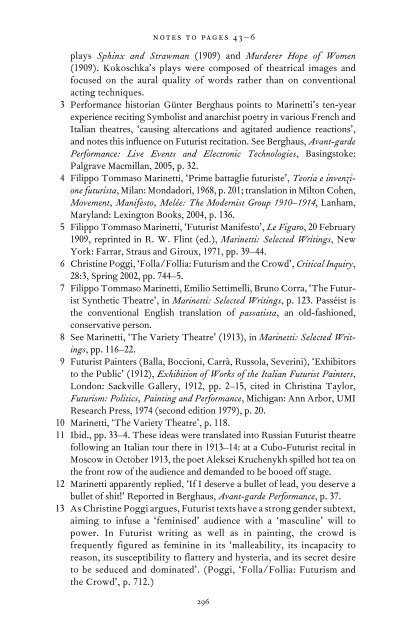Participatory Art and the Politics of Spectatorship - autonomous ...
Participatory Art and the Politics of Spectatorship - autonomous ...
Participatory Art and the Politics of Spectatorship - autonomous ...
You also want an ePaper? Increase the reach of your titles
YUMPU automatically turns print PDFs into web optimized ePapers that Google loves.
notes to pages 43– 6<br />
plays Sphinx <strong>and</strong> Strawman (1909) <strong>and</strong> Murderer Hope <strong>of</strong> Women<br />
(1909). Kokoschka’s plays were composed <strong>of</strong> <strong>the</strong>atrical images <strong>and</strong><br />
focused on <strong>the</strong> aural quality <strong>of</strong> words ra<strong>the</strong>r than on conventional<br />
acting techniques.<br />
3 Performance historian Günter Berghaus points to Marinetti’s ten- year<br />
experience reciting Symbolist <strong>and</strong> anarchist poetry in various French <strong>and</strong><br />
Italian <strong>the</strong>atres, ‘causing altercations <strong>and</strong> agitated audience reactions’,<br />
<strong>and</strong> notes this infl uence on Futurist recitation. See Berghaus, Avant- garde<br />
Performance: Live Events <strong>and</strong> Electronic Technologies, Basingstoke:<br />
Palgrave Macmillan, 2005, p. 32.<br />
4 Filippo Tommaso Marinetti, ‘Prime battaglie futuriste’, Teoria e invenzione<br />
futurista, Milan: Mondadori, 1968, p. 201; translation in Milton Cohen,<br />
Movement, Manifesto, Melée: The Modernist Group 1910– 1914, Lanham,<br />
Maryl<strong>and</strong>: Lexington Books, 2004, p. 136.<br />
5 Filippo Tommaso Marinetti, ‘Futurist Manifesto’, Le Figaro, 20 February<br />
1909, reprinted in R. W. Flint (ed.), Marinetti: Selected Writings, New<br />
York: Farrar, Straus <strong>and</strong> Giroux, 1971, pp. 39– 44.<br />
6 Christine Poggi, ‘Folla/ Follia: Futurism <strong>and</strong> <strong>the</strong> Crowd’, Critical Inquiry,<br />
28:3, Spring 2002, pp. 744– 5.<br />
7 Filippo Tommaso Marinetti, Emilio Settimelli, Bruno Corra, ‘The Futurist<br />
Syn<strong>the</strong>tic Theatre’, in Marinetti: Selected Writings, p. 123. Passéist is<br />
<strong>the</strong> conventional English translation <strong>of</strong> passatista, an old- fashioned,<br />
conservative person.<br />
8 See Marinetti, ‘The Variety Theatre’ (1913), in Marinetti: Selected Writings,<br />
pp. 116– 22.<br />
9 Futurist Painters (Balla, Boccioni, Carrà, Russola, Severini), ‘Exhibitors<br />
to <strong>the</strong> Public’ (1912), Exhibition <strong>of</strong> Works <strong>of</strong> <strong>the</strong> Italian Futurist Painters,<br />
London: Sackville Gallery, 1912, pp. 2– 15, cited in Christina Taylor,<br />
Futurism: <strong>Politics</strong>, Painting <strong>and</strong> Performance, Michigan: Ann Arbor, UMI<br />
Research Press, 1974 (second edition 1979), p. 20.<br />
10 Marinetti, ‘The Variety Theatre’, p. 118.<br />
11 Ibid., pp. 33– 4. These ideas were translated into Russian Futurist <strong>the</strong>atre<br />
following an Italian tour <strong>the</strong>re in 1913– 14: at a Cubo- Futurist recital in<br />
Moscow in October 1913, <strong>the</strong> poet Aleksei Kruchenykh spilled hot tea on<br />
<strong>the</strong> front row <strong>of</strong> <strong>the</strong> audience <strong>and</strong> dem<strong>and</strong>ed to be booed <strong>of</strong>f stage.<br />
12 Marinetti apparently replied, ‘If I deserve a bullet <strong>of</strong> lead, you deserve a<br />
bullet <strong>of</strong> shit!’ Reported in Berghaus, Avant- garde Performance, p. 37.<br />
13 As Christine Poggi argues, Futurist texts have a strong gender subtext,<br />
aiming to infuse a ‘feminised’ audience with a ‘masculine’ will to<br />
power. In Futurist writing as well as in painting, <strong>the</strong> crowd is<br />
frequently figured as feminine in its ‘malleability, its incapacity to<br />
reason, its susceptibility to flattery <strong>and</strong> hysteria, <strong>and</strong> its secret desire<br />
to be seduced <strong>and</strong> dominated’. (Poggi, ‘Folla/ Follia: Futurism <strong>and</strong><br />
<strong>the</strong> Crowd’, p. 712.)<br />
296
















